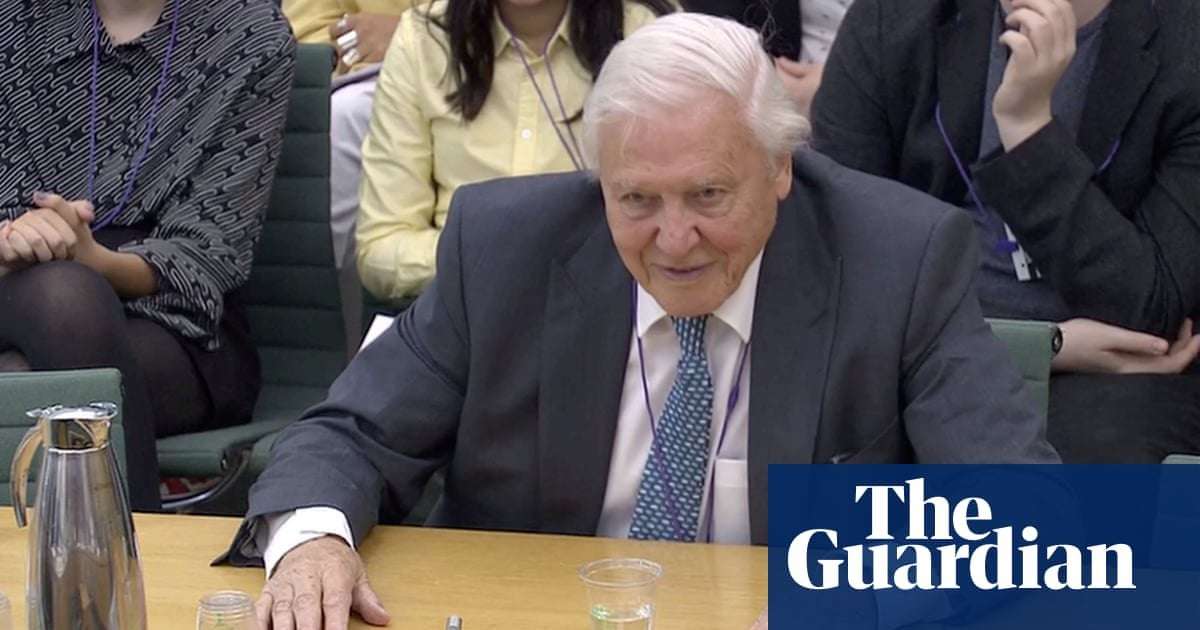The attitude of young people towards tackling the environmental crisis is “a source of great hope”, David Attenborough has told MPs, as he predicted that polluting the planet would soon provoke as much abhorrence as slavery.
Giving evidence to the business, energy and industrial strategy committee on how to tackle the climate emergency, the naturalist and TV presenter said radical action was required.
Asked by the Tory MP Patrick McLoughlin, a committee member, whether the government’s new commitment of net zero carbon emissions for the UK by 2050 was rapid enough, Attenborough said such targets were not necessarily the best approach.
“In a way I would think that is not the way of focusing on the problem,” he said. “We cannot be radical enough in dealing with the issues that face us at the moment. The question is: what is practically possible? How can we take the electorate with us in dealing with these things?”
He said: “The most encouraging thing that I see, of course, is that the electors of tomorrow are already making themselves and their voices very, very clear. And that is a source of great comfort in a way, but also the justification, the reality, that these young people are recognising that their world is the future.
“I’m OK, and all of us here are OK, because we don’t face the problems that are coming. But the problems in the next 30 years are really major problems that are going to cause social unrest, and great changes in the way that we live, and what we eat. It’s going to happen.”
Asked by the Labour MP Vernon Coaker to expand on how public attitudes were shifting, Attenborough replied: “There was a time in the 19th century when it was perfectly acceptable for civilised human beings to think that it was morally acceptable to actually own another human being for a slave. And somehow or other, in the space of 20 or 30 years, the public perception of that totally transformed.”
He said: “I suspect that we are right now in the beginning of a big change. Young people in particular are the stimulus that’s bringing it about.
“People are understanding that to chuck plastic into the ocean is an insult. To have the nerve to say: ‘This is our rubbish. We’ll give you money and you can spread it on your land instead of ours, in the far east,’ is intolerable. And for some reason or other young people understand that. And that’s a source of great hope to me.”
Asked for his most vivid impressions of the impact of humans on the planet, Attenborough recalled returning to the Great Barrier Reef off Australia, where he had first dived in the 1950s.
“I will never forget diving on the reef about 10 years ago and suddenly seeing that instead of this multitude of wonderful forms and life, that it was stark white, it had bleached white because of the rising temperatures and the increasing acidity of the sea,” he said. “If you wipe that out you wipe out whole areas of the ocean.”
Another example was returning to a glacier in South Georgia after 10 years and finding it was not even visible.
Attenborough stressed that the important point was the overall picture: “Sceptics will say: ‘I can take you to another place where glaciers grew,’ or something, or ‘I can take you to a place where the coral reefs are flourishing.’ So it’s difficult to pick one point and one site where you can actually say it’s proof. It isn’t. It’s just an example.”
Asked about the impact of his Blue Planet II series on awareness about plastic in oceans, Attenborough said he had spent 20 years trying to raise awareness of the issue.
“I’d been putting it in programmes for years, but nobody took much notice of it,” he said. “And in Blue Planet II it was a sequence that lasted two minutes maximum, I should say, and yet for some reason – if I knew what the reason was I’d be a richer man, I dare say – it rang a bell in the public consciousness. I’ve never seen anything like it.”
Attenborough said he nonetheless never set out to be a campaigner: “I’m not by nature a propagandist. I started making natural history programmes because I thought there was nothing I would prefer to see more than the beauty of the natural world. And I would love to just go on doing that. That’s what I enjoy.”

lud1120 on July 9th, 2019 at 13:15 UTC »
Nervous every time I see "David Attenborough" in a headline as he's 93 years old, but so far so good it seems.
Sigh_SMH on July 9th, 2019 at 12:05 UTC »
A large piece of the world is still cool with slavery tho...
Iplaydeadpeople on July 9th, 2019 at 11:57 UTC »
Wouldn't that be lovely.